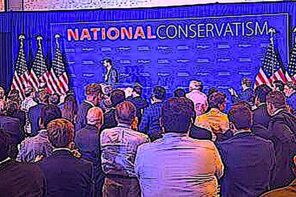Just a few months ago, Jeb Bush was being hailed as the GOP presidential candidate who would change how Republicans talk about gay marriage in 2016. “Has Jeb Bush offered the Republican Party a new way to talk about same-sex marriage?” the Washington Post asked in January. “Bush said people should accept court rulings that legalize same-sex marriage and ‘show respect’ for gays in committed relationships, while reiterating his long-held belief that ‘marriage is a sacrament'”—a message the Post declared “more welcoming” than that of the old GOP.
But this month Bush appears to have had a change of heart. After receiving plaudits from influential conservatives for his speech on religious freedom at Liberty University’s commencement last week, he took some heat not using the occasion to mention same-sex marriage. At The American Conservative, Rod Dreher warned that Bush “can’t avoid forever the greatest threat to religious freedom in our present moment: the advance of gay rights.”
The writer Eric Metaxas, fresh off an appearance on the topic at Fox and Friends, said on his podcast last Monday, “I was glad Jeb Bush brought up religious liberty, but I wish he had spoken about same-sex marriage. I wish he had been a little bit more willing to throw that out there because nobody can get the GOP nomination unless they deal with this head on, because people are really, really scared.”
What are they scared of, exactly? Cultural change, and more. According to Metaxas, being forced to provide services to same-sex weddings, like flowers and cakes. According to Dreher, the loss of tax-exempt status for religious non-profits who oppose marriage equality—a prospect legal experts believe is unlikely.
“I know that Republican candidates get extremely squeamish when talking about anything to do with homosexuality,” Dreher went on. (When he says “squeamish,” he appears to mean the candidates are too apprehensive to express the conservative view, which goes against the tide of public opinion, not that they are squeamish about talking about homosexuality. Which they may well also be.) “[W]hat do Republican candidates plan to do to protect religious liberty in this new legal environment for gay rights?” Dreher demanded. “It’s not enough to mouth pro-religious platitudes. Conservatives must expect more.”
Six days later, Bush was on camera with the Christian Broadcasting Network’s David Brody, whose television program and blog The Brody File offer Republican candidates a safe space to field easy questions tailored for a primary voter with doubts about the candidate’s ideological purity. When Brody asked him about same-sex marriage, Bush punctuated his opinion that there is no constitutional right to same-sex marriage with the disclaimer, “I’m not a lawyer.”
But what to do if the Court rules that there is such a constitutional right? “Irrespective of the Supreme Court ruling,” he said, “we need to be stalwart supporters of traditional marriage.”
That’s not an answer, exactly. Sure, conservatives want to hear there will still be “stalwart supporters of traditional marriage.” But that’s just pabulum, and worse, it’s so 2012! In 2016, they’re looking for the candidates to describe how to protect them in the brave new world of two-bride wedding cakes. “This is not about serving a cupcake to someone who’s gay, of course you have to do that, obviously,” Brody offered. “This is more about the vendor issue as it relates to do they want to provide a service for same-sex weddings. Are you okay if they don’t provide those types of services? Is that okay?”
“Absolutely,” Bush replied, segueing to the case of Barronelle Stutzman, the Washington State florist who has become a conservative cause célèbre. “She had a regular customer who came in and she would provide flowers to him, and he was going to marry his significant other,” said Bush. “Asked her to participate as a friend in the wedding, to help organize it. And she thought about it, and said, look, I love you, you’re my friend, but I can’t participate. It goes against my conscience.”
Of course Bush isn’t a lawyer, so he may not be aware that many states, including Washington, have laws that prohibit discrimination in public accommodations based on sexual orientation. As he and Brody noted, the baker must serve a gay man a cupcake. Bush, who’s not a lawyer, may not have read the court opinion in the Stutzman case, which describes how Stutzman herself recalled the exchange with her customer, Robert Ingersoll, about the flowers for his wedding.
According to the trial court’s decision, finding that Stutzman had violated the state’s anti-discrimination law, Stutzman testified in her deposition that Ingersoll “came in and we were just chitchatting and he said that he was going to get married. Wanted something really simple, khaki I believe he said. And I just put my hands on his and told him that because of my relationship with Jesus Christ I couldn’t do that, I couldn’t do his wedding.” In other words, Ingersoll didn’t ask Stutzman to “help organize” his wedding, nor did Stutzman tell him she loved him. He asked her to provide flowers, and she said she wouldn’t. (The Stutzman case is on appeal, after she rejected a settlement offer from the state’s attorney general to pay a $2,000 fine and agree not to discriminate against same-sex couples in the future.)
Bush, looking ahead to the general election, may have wanted to avoid talking about same-sex marriage altogether. But now that he has bowed to the religious base’s demand that he take a stand, he is going to be stuck with it.




